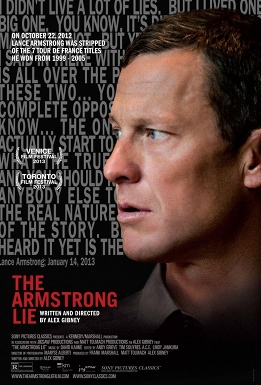In 2009, Oscar-winning director Alex Gibney set out to document Lance Armstrong's triumphant return to the world of competitive cycling. Focused on uncovering the will and drive to compete that made this cancer survivor a worldwide hero (and miracle), Gibney uncovered a man who didn't know how to lose. After the doping scandal erupted, the film was shelved, only to be re-opened after Armstrong's candid confession. The Armstrong Lie picks up in 2013, with a new focus, a new intent, and a new purpose.
Footage from both 2009 and 2013 are intertwined as Gibney uses a wide variety of interviews to piece together the lie that Armstrong and his team lead for years. And while few had anything nice to say about the seven-time Tour de France champion, it was the resentment and deep anger by his teammates and colleagues that stays with you the longest.
Unlike other celebrated athletes who are idolized and respected for their domination of a sport, Armstrong is seen as a man who often abused his power by intimidating those around him. Resentment grows as you witness Armstrong in the flesh, away from the reporters and the masked persona that comes forth during interviews and public appearances. In no time at all, you realize that Lance Armstrong is an intelligent bully who thrived on the chance to get away with breaking the rules. And while doping has always been a huge concern within the world of competitive cycling, Armstrong's cocky attitude and his inability to connect with others reveals a hollow interior to a man who became corrupted by the glory, fame, and thrill of beating the system and winning it all.
Gibney repeatedly admits to his growing fascination with Armstrong, often calling himself out as he became transfixed by the legend. He took the doping lie personal, seeing Armstrong as a friend and his trickery a direct break in that unspoken bond. This marks one of the film's few missteps as Gibney's relationship, on a few rare occasions, is too close for comfort. All documentaries are biased to some degree, and a level of emotion is what makes the genre so captivating. But even by his own admittance, The Armstrong Lie has an abnormal level of connection between director and subject, one that grows throughout the 2009 footage as Gibney begins to buy into the story and philosophy that Armstrong is selling.
But much of the focus and attention is taken off of Armstrong in several instances when the film opts to branch out and examine the doping problem within the sport as a whole. And it is a good thing too, as this brings a sense of awareness to the viewer as they become knowledgeable enough to understand the situation and fully address exactly what went on during Armstrong's run of impressive wins. Gibney is smart not to go into too much detail, refusing to lose sight of his main purpose and keep the film centered on Armstrong and his fascination with beating the system, but the occasional aside helps to pace the film and keep it both informational and entertaining as he works to shine a little more light on a situation that few fully understand.
In the end, Gibney finishes with a film that he never intended to make. And while The Armstrong Lie isn't the best documentary of the famed director's career (nor the shortest at just over two hours), it is an entertaining, educational, and highly revealing look at just how much control one man had over one of the most popular sports worldwide for nearly a decade.

